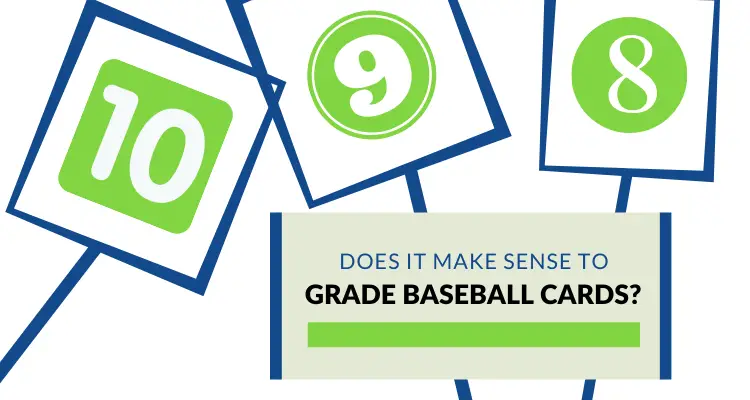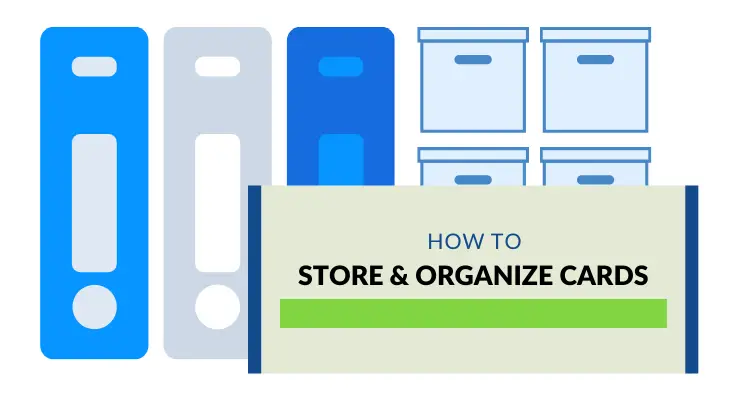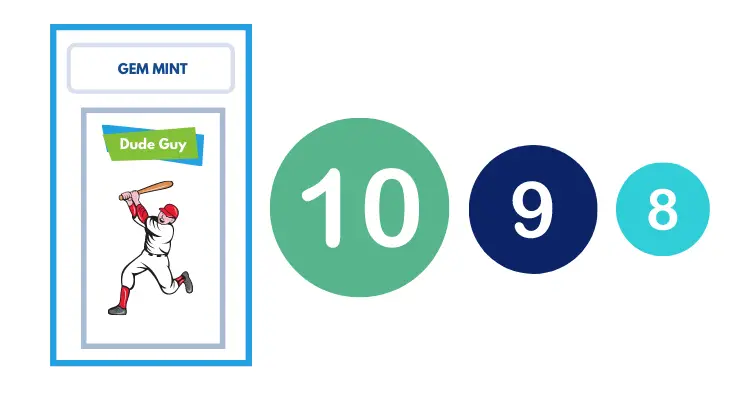 Ryan Barone (@ballcardgenius on TikTok, Card Expert) is a lifelong member of the hobby. He has been quoted in PSA Magazine, and his content has regularly been mentioned in “Quick Rips” (the Topps RIPPED Newsletter) and across other hobby publications. Join his 8,600 followers on TikTok! hello@ballcardgenius.com; Last Time Ago LLC dba Ballcard Genius.
Ryan Barone (@ballcardgenius on TikTok, Card Expert) is a lifelong member of the hobby. He has been quoted in PSA Magazine, and his content has regularly been mentioned in “Quick Rips” (the Topps RIPPED Newsletter) and across other hobby publications. Join his 8,600 followers on TikTok! hello@ballcardgenius.com; Last Time Ago LLC dba Ballcard Genius.
Affiliate Disclosure: This post contains affiliate links. As I am a part of the eBay Partner Network and other programs, if you follow these links and make a purchase, I’ll receive commission. As an Amazon Associate, I earn from qualifying purchases.
The best card grading service is offered by PSA thanks to its leading reputation and resale values. In fact, PSA graded over 1 million cards in August 2023 alone, while the next highest company, SGC, graded just over 100,000. That said, the “best” is subjective, and if turnaround time, cost, and/or look of the slab are of utmost importance, you might have a different opinions.
If you’d like to quickly find a service depending on your card’s declared value and desired turnaround time, utilize the tool below:

Card Grading Calculator
Anyway, while the three-letter names below (along with others) might all sound a bit similar, the cost of card grading, how to get cards graded, and their resulting values will differ by each company.
Here is a list of the top sports card grading services:
- PSA (Professional Sports Authority)
- BGS (Beckett Grading Services)
- SGC (Sportscard Guaranty Corporation)
- CSG (Certified Sports Guaranty)
- HGA (Hybrid Grading Authority)
- TAG (Technical Authentication & Grading)
- BVG (Beckett Vintage Grading)
- BCCG (Beckett Collector’s Club Grading)
- ISA (International Sports Authentication)
- Arena Club
- Rare Edition
As mentioned, among the top grading services in August 2023, according to Gem Rate, PSA let the way with 1.23MM cards graded, followed by SGC (118K cards), and Beckett (75K cards).
August ’23 Grading Recap
— GemRate (@gemrate) September 1, 2023
Overall grading activity was +21% vs July, +30% YoY
— PSA graded 1.23m cards (+18% vs July, +38% YoY)
— SGC graded 118k cards (+25% vs July, +58% YoY)
— CGC graded 106k cards (+52% vs July, -38% YoY)
— Beckett graded 75k cards (+31% vs July, +82% YoY) pic.twitter.com/uwDcXEpVfJ
1. PSA (Professional Sports Authority)
PSA stands for Professional Sports Authority and is one of the more popular grading companies among collectors. You can easily identify PSA from their simple red-bordered white label (and PSA hologram on newer slabs).
According to the PSA website, it is mentioned that “PSA has certified over 40 million cards and collectibles.” Of course, it doesn’t speak to the number of cards graded, but this tweet helps shed some light on just how many cards are being graded (or how many were being graded not long ago):
PSA announces they are now grading more than 35,000 cards a day, devoting 90 percent of their daily capacity to the grading backlog.
— Darren Rovell (@darrenrovell) September 9, 2021
The goal is to bring back regular service by the end of the year.
Cards graded on the Express Level will now cost $150 instead of $200.
Bonus term: If you hear someone saying that they submitted a card to PSA and it “gemmed,” then that means the card was graded a perfect 10, or, gem mint by PSA standards.
When you’re scrolling eBay you have probably seen listings like “PSA 10” or “PSA 9 OC.” These numbers represent the actual grade the card received after being graded. That is, you want to make sure the card listing is in fact a PSA slabbed card (meaning it’s encapsulated in the PSA holder with label affixed).
In addition, you might see other titles and descriptions like “PSA-ready card.” This means the card for sale is actually a raw card (one that hasn’t been graded) but the seller is saying is in good condition. Of course, this is all based on personal opinion, and you have to remember it’s the seller who is describing the card this way…
All in all, many consider PSA to be the best grading company around, which offers a number of different services and even in-person grading on-location and at different events.
2. BGS (Beckett Grading Services)
BGS stands for Beckett Grading Services, a company with a name you might be familiar with thanks to their long history of publishing baseball card price guides. Other than their logo and naming, you can identify BGS slabs as those that are a bit bulkier than others, and often featuring their recognizable subgrades.
Bonus term: You might see BGS slab descriptions appended with the mention of “quads” as in “quad 9.5s,” which means all four subgrades – corners, surface, centering, and edges – received a 9.5 grade.
You might also see mentions of “BVG” and it being related to Beckett. BVG stands for Beckett Vintage Grading, so in the sense that BVG and BGS are both Beckett grading arms, then yes. But, from that same explanation, it’s easy to see where to two differ—BVG is described on the Beckett.com site as “Quality vintage grading service for your pre-1981 cards.”
And while I won’t dedicate an entire section to it, BCCG is also different than BGS. Check out the differences between BCCG and other companies, like PSA.
(BGS is actually one of the cheapest card grading services at the moment.)
If there is a debate about which is the best grading company it’s typically an argument between Beckett vs. PSA, and which is better.
3. SGC (Sportscard Guaranty Corporation)
SGC stands for Sportscard Guaranty Corporation, and in terms of looks, are known for their “tuxedo” or “tux” slabs – as they’ve been dubbed – thanks to their refined black and white design.
One thing that might set SGC apart from other grading companies is that is could be considered the fastest card grading service thanks to 1-2 business day turnaround for $125 per card.
Of course, PSA and SGC offer in-person grading services. but that’s at an estimated 3-day turnaround, and costs $600 and $150 per card, respectively.
Read more:
4. CSG (Certified Sports Guaranty)
CSG stands for Certified Sports Guaranty, and while it sounds similar to SGC mentioned above, it’s a different company, and is considered a “new kid on the block” in terms of grading companies.
I’ll be honest, I’m not extremely familiar with CSG, their offerings, and benefits, so let’s take a look at what Twitter has to say.
I’ve seen that CSG is a tough grader, but may be a little more forgiving with their label switch. Speaking of the label switch, people seem to really enjoy the new look over the old.
Yeah old label csg harsher grading. I really like the new label CSG tho. I’d probably go with them over anyone for my PC stuff
— Carolina Card Co. (@CarolinaCardCo) September 26, 2022
Here is another bit mentioning the toughness of SCG grading, and an SGC 10 10 probably being a very good candidate to crossover to a 10 from another company like PSA:
They are a very good company and very accurate graders. Obviously grading is subjective and any grader on any day could have a different opinion on a card that even their own company graded, but a CSG 10 should have a very good crossover chance at PSA.
— Mike’s Retro Trading Cards (@MikesUpperDeck1) September 24, 2022
Read More: PSA Crossover Cost
5. HGA (Hybrid Grading Authority)
HGA stands for Hybrid Grading Authority, and according to their website, offers “color coordinated labels providing you with the most aesthetically pleasing cards ever seen.”
Card Grading Resources
So, hopefully that helps clear things up for you—if you’re still in the information-gathering stage, and would like to learn more about grading cards, consider these resources:
Should you grade your cards?
How much does it cost to grade cards?
Are graded cards worth more?
Where can you get cards graded in person?



